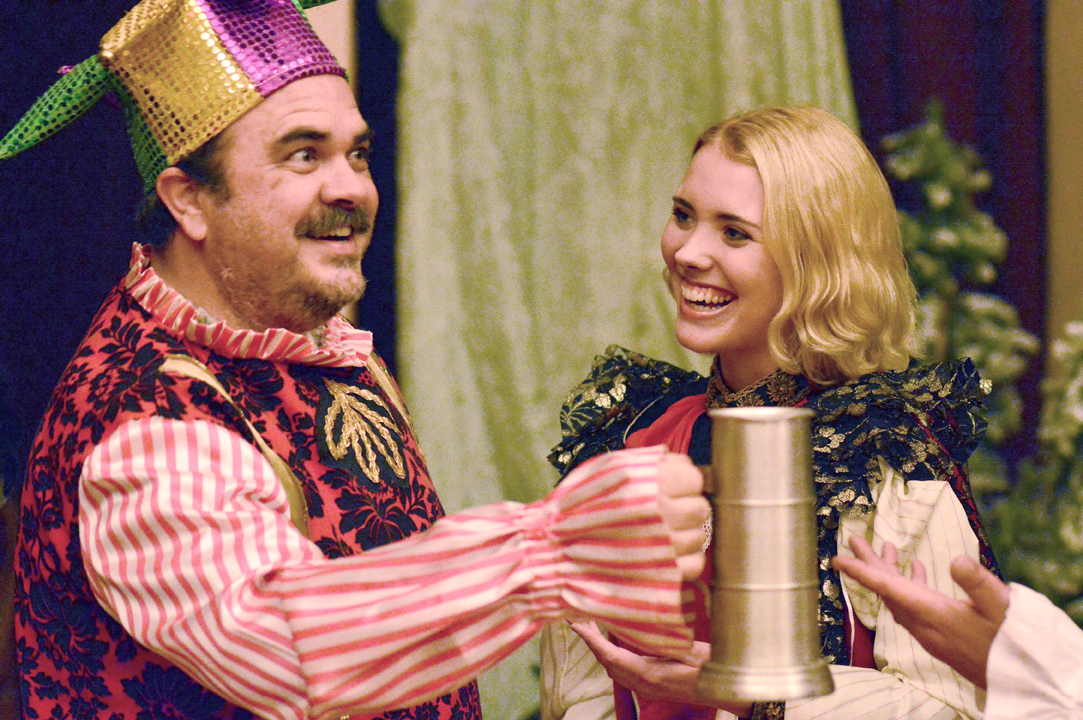SEQUIM — Here’s a romantic comedy with delicious bits.
We’re talking lines such as “Then come kiss me, sweet and twenty, youth’s a stuff will not endure,” “Make me a willow cabin at your gate” and that classic, “If music be the food of love, play on.”
That’s Duke Orsino, and he will play on with friends and countrymen as Shakespeare’s “Twelfth Night, or What You Will” unfolds in Olympic Theatre Arts’ transformed Gathering Hall. The 410-year-old story of love, longing and cross-dressing, now an OTA tradition, will arrive at 3 p.m. both Saturday and Sunday as a staged reading with a cast of veterans and newcomers.
Tickets are $10 via olympictheatrearts.org and 360-683-7326 today; if still available they will be sold up to an hour before show time at OTA, 414 N. Sequim Ave. The bar, with snacks and seasonal drinks, also opens an hour before curtain.
Mark Valentine, an accomplished actor in the Shakespearean realm, portrays Orsino, “a nobleman fawning with love pangs for Olivia,” as he puts it. But Lady Olivia, the well-off countess, “would rather eat hay than return his love,” Valentine observes. She falls for Cesario, Orsino’s messenger.
This Cesario is actually our heroine Viola disguised as a man. She is smitten by Orsino, so we have on our hands a transgender love quadrangle.
But that’s not enough for Shakespeare. In “Twelfth Night” we also meet Malvolio, Olivia’s snooty steward, who is tricked into believing his boss is interested in him romantically.
Keith Curtis plays Malvolio — just as he did in the 2015 production — and his portrayal of the character’s courtship machinations “is hilarious and worth the price of donation right there,” proclaimed Valentine.
Christie Honore, a Sequim High School alumna in her second year studying drama at Vassar College in Poughkeepsie, N.Y., plays Olivia, a woman who is straightforward and constant amid the chaos.
“She’s up front about her crush on Cesario,” said Honore, “and her reaction to Malvolio’s overtures is hilarious in its honesty. She’s never trying to crack a joke or elicit a laugh, [so] the comedy occurs naturally when she maintains her serious nature.”
Honore gets serious herself: “This play explores identity,” she added, and “proves just how important honesty is in order for a relationship to be successful.
“When the characters are in disguise and not true to themselves, it proves disastrous for their relationships, and hilarious for the audience.”
This is Honore’s third year playing Olivia in OTA’s “Twelfth Night,” so she continues to relish the romance, the trickery and the revelry with those in the local theater scene.
Valentine is a “Twelfth Night” veteran too, as are Karl Hatton as Feste the jester, Kira Hendricksen as Viola/Cesario, Joel Yelland as Sebastian and Carl Honore as Sir Andrew Aguecheek.
Rich Hendricksen, also the director, portrays Sir Toby Belch. And yet another Hendricksen, Rich’s son Leif, portrays Antonio, Sebastian’s rescuer and friend.
Don’t fret about the Elizabethan language here, says Leif, an English and history teacher at Sequim Middle School.
“Reading Shakespeare in high school is very different from seeing it performed,” he says.
Words aren’t everything. The body language and general frolic bring the story to life — and this play has proved so popular during the past two years that OTA has added a second performance and expanded the seating in the hall, which is turned into what’s affectionately called an Elizabethan House of Revelry.
Patrons are invited to come in costume, because the players will stroll among the tables, regaling everyone with poetic dialogue.
New to the production this year are Kai Lavatai as Fabian, Olivia’s attendant, and Jennifer Horton, who played Truvy in 2015’s “Steel Magnolias” at OTA, as Olivia’s gentlewoman Maria.
Also appearing are Elizabeth Duval as Curio and Valentine, and Steve Schultz and Jared Kneidl in dual roles of priest and soldier and sea captain and soldier, respectively.
“It’s a great group, and everyone just wants to have a good time with the Bard,” says Valentine, who notes also that in this story, the people don’t get what they want. They get what they need.
“And it is better,” Valentine adds, “than they could have dreamed.”

